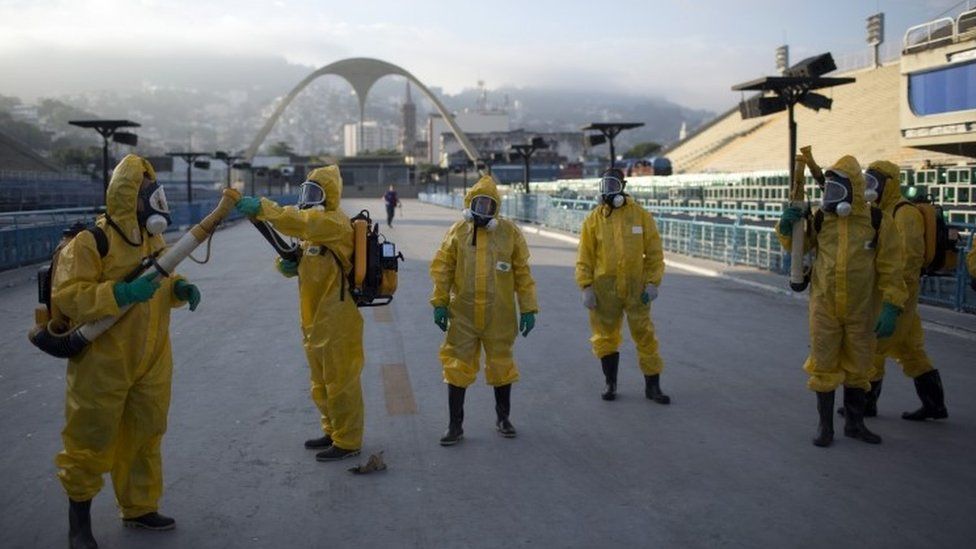Zika crisis: WHO seeks to allay fears over Rio Olympics
- Published

The World Health Organization (WHO) has played down concerns over the spread of the Zika virus, amid calls for the Rio Olympics in August to be postponed.
Senior WHO official Bruce Aylward told the BBC that risk assessment plans were in place, and reiterated that there was no need to delay the Games.
The mayor of Rio said disease-carrying mosquitoes were being eradicated.
The officials were responding to an open letter by scientists saying it was "unethical" for the Games to go ahead.
The letter also said the global health body should revisit its Zika guidance.
The Zika virus is linked to severe birth defects.
Between February and April, Brazil registered more than 90,000 likely cases of Zika. The number of babies born with Zika-linked defects stood at 4,908 in April.
Dr Bruce Aylward: "I think we need to do a better job of communicating with those concerned"
Dr Aylward, who heads the WHO's emergency programme, told the BBC that it was already carrying out a risk-assessment programme "about this disease and the risks it poses both to individuals who get and those who might be subsequently exposed".
In addition, he said, independent experts had reported to the WHO on the implications of the outbreak for travel and trade.
"Those are two of the exact measures that that group has asked for and that is exactly what is being done, and clearly we need to have better communicated that."
Challenge for the IOC - Dan Roan, Sports Editor, BBC News
The World Health Organization is key here. As long as it continues to reject pleas to cancel or move the Games from Rio, the IOC will feel confident.
No contingency plans are being put in place should the doomsday scenario occur.
And privately, the IOC seems more concerned by the doping crisis; allegations of state-sponsored cheating at the 2014 Sochi Games, and the question mark over the participation of Russian athletes in Rio, than it is by Zika.
But if the WHO changes its tune, the IOC would be left facing one of the biggest challenges in its history.
Two years ago, it had to bar young athletes from the Ebola-affected region of West Africa from participating in certain events at the Youth Olympic Games in Nanjing, China, to rule out infection. But this would be on a whole different scale.
More on the Zika crisis:
Microcephaly: Why it is not the end of the world
What you need to know Key questions answered about the virus and its spread
Travel advice Countries affected and what you should do
The mosquito behind Zika What we know about the insect
Abortion dilemma Laws and practices in Catholic Latin America
The International Olympic Committee (IOC) has said it sees no reason to delay or move the Games because of the mosquito-borne disease.
Mr Aylward said that a call to postpone the Games could not be ruled out in the future, but added: "All the information available today... suggests that the games should definitely go ahead."
He restated the WHO's warning that women who are pregnant or seek to get pregnant should not travel to the Zika zone or be exposed to returning partners who may have been infected.
Postponing the games, at this stage, would only "compromise the huge investment that athletes and others have made in preparing for what should be a fantastic occasion."
In their open letter, the 150 scientists said Brazil's mosquito-eradication programme had failed. They cited this, and the country's "weakened" health system, as reasons to postpone or move the Olympics.
In his reply, Rio Mayor Eduardo da Costa Paes said:
- The city has over 3,000 health officials monitoring the presence of mosquitoes across Rio
- Inspections will be stepped up in August, a time of year when there are anyway fewer mosquitoes
- A team of eradicators will start focusing on Olympic venues a month before the Games.
Zika infection in pregnant women has been shown to be a cause of microcephaly and other brain abnormalities in babies.
In February, the WHO declared recent outbreaks of those diseases in Latin America and French Polynesia a global health emergency requiring a united response.
It said stepping up programmes to eradicate mosquitoes that spread the Zika virus were a priority.